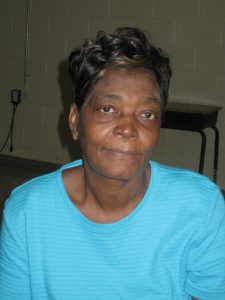Interviewee: Cora Tonge
Interviewer: Jeffrey Boyce
Date: June 27, 2016
Description: Cora Tonge is a foodservice worker in the Virgin Islands.
Jeffrey Boyce: I’m Jeffrey Boyce and it is June 27, 2016. I’m here on St. Thomas in the Virgin Islands this morning with Cora Tonge. Welcome Cora and thanks for taking the time to talk with me. Could we begin today by you telling me a little bit about yourself, where you were born and where you grew up?
Cora Tonge: I was born in Antigua.
JB: So you went to school on Antigua?
CT: [Nods her head affirmatively.]
JB: Did they have a lunch program there at the school?
CT: No. You just have to carry your lunch, or go home and eat your lunch and then come back to the school.
JB: OK. So was that a British island?
CT: Yes.
JB: OK. So they didn’t do lunch programs.
CT: No.
JB: OK. So what brought you to St. Thomas?
CT: My mother send for me here, get me green card, naturalize. I have children born here. I have five children born here. Five them go one school. Every one of them, and then they come here. They go either McCann then graduate from either McCann. They go to college. They have their bachelor, their master’s degree.
JB: That’s wonderful.
CT: So I don’t have no children no more no school. I have one little granddaughter and she go New Testament Academy. And then she promote from the kindergarten to the first grade.
JB: That’s wonderful. How did you get involved working with child nutrition?
CT: Before I get fulltime I just do part-time. And I continue work and work and work until I get hired in ’98, ’98 when I get fulltime, December 7, ’98.
JB: You’ve been doing it a while then.
CT: I have in eighteen years.
JB: And what’s your job title?
CT: Food service worker.
JB: OK. And what is a day like for you?
CT: Good. I have no problem. Good.
JB: What are your duties? What do you do during the day? You come in at what, six?
CT: Yea, and stay ‘til two.
JB: And what do you do during that time?
CT: You wash dishes, you do different work in here, you do different stuff. You go on the line, you feed the children. And then when you finish you come out here, you clean up. Some wash dishes, some wash the pots and pans.
JB: What do you like most about your job?
CT: Everything. I love it.
JB: What are some of the children’s favorite food items? What do they like to eat?
CT: They like hamburger, they like anything, but not the fish. They don’t like the fish. Like we do salmon, tuna, no, they don’t like that. They love veggies, veggie burgers, and they love the pizza.
JB: What changes have you seen in the program over these eighteen years you’ve been working?
CT: Everything good to me, everything good.
JB: Do you have any memorable stories about kids you’ve served or people you’ve worked with over the years?
CT: Oh, well, you know, you meet good and you meet bad. But we don’t study that. I love here. When I go to Governor’s School [unintelligible] eighteen years, I ask for a transfer because, umm, it was too much for me. And I asked the transfer, so Ms. Isaak put me here.
JB: What advice would you give someone who was thinking about trying to get a job like yours today?
CT: Then when they ask I tell her where to go, but I don’t tell them, make them come and see for their self.
JB: Anything else you’d like to add today?
CT: A good job, you know, a good job, good for work, you know, but the salary so small.
JB: Well thanks for taking the time to talk with me.
CT: OK. Thank you.